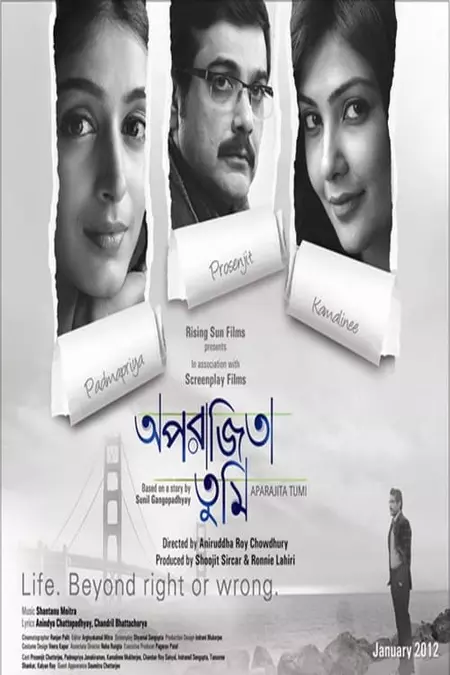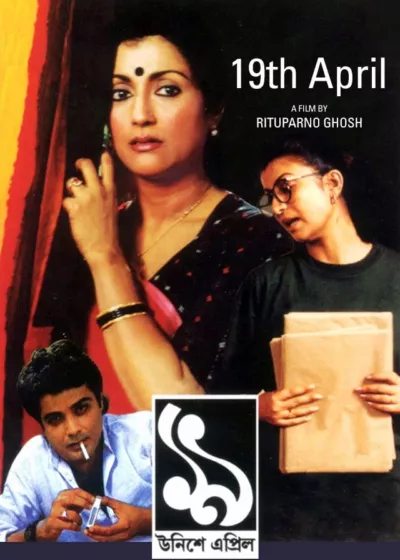Unishe April (1994)
November 18, 1994Release Date
Plot.
Where to Watch.
 Subs
Subs Subs
Subs Subs
SubsCurrently Unishe April is available for streaming online, rent, buy or watch for free on: Hoichoi, Amazon Prime Video with Ads, Amazon Prime Video
Streaming in:🇺🇸 United States

Cast & Crew.

Aparna Sen
Sarojini 'Babli' Gupta

Debashree Roy
Dr. Aditi 'Mithu' Sen

Prosenjit Chatterjee
Sudip

Dipankar Dey
Somnath

Dipankar Dey
Somnath

Chitra Sen
Bela 'Boya'

Bodhisattva Mazumdar
Dr. Manish Sen

Sudeshna Roy

Ahana Banerjee

Malay Bhattacharya

Rupa Das

Puspita Gangopadhyay

Rituparno Ghosh
Director / Screenplay

Shoubhik Mitra
Executive Producer

Ujjal Nandi
Editor

Raja Biswas
Costume Designer

Bhim Naskar
Makeup Artist

Robin Naskar
Assistant Makeup Artist

Debabrata Dutta
Assistant Director

Sudhendu Mishra
Assistant Director

Alok Mitra
Assistant Director

Sumanta Mukherjee
Assistant Director

Rana Paul
Assistant Director

Sohag Sen
Assistant Director

Chinmaya Nath
Sound

Renu Roy
Producer

Sunirmal Mazumdar
Cinematography

Jyotishka Dasgupta
Music

Ingmar Bergman
Original Concept

Dipanwita Mukherjee

Probir Ghosh

Madhuchhanda Ghosh

Tapas Thakur

Sumit Roy

Dipanwita Nag
Details.
Release DateNovember 18, 1994
Original Nameউনিশে এপ্রিল
StatusReleased
Running Time2h 13m
Genres
Last updated:
This Movie Is About.
Wiki.
Unishe April (Bengali pronunciation: [u̯niʃe epril], transl. April 19) is a 1994 Indian Bengali-language drama film directed by Rituparno Ghosh and produced by Renu Roy under the banner of Spandan Films. It stars Aparna Sen, Debashree Roy, Prosenjit Chatterjee, Boddhiswatta Majumdar and Deepankar De. The music of the film was composed by Jyotishka Dasgupta.
Unishe April marked Ghosh's second directorial venture after Hirer Angti (1992). A loose remake of Ingmar Bergman's film Autumn Sonata (1978), it opened to widespread acclaim, with critical praise drawn towards the screenplay and performances by the lead actors—especially that of Sen and Ray, the latter eventually winning the National film Award for Best Actress. Ghosh, besides directing the film, also wrote the screenplay while the cinematography was handled by Sunirmal Mazumdar.
The film's narrative revolves around the tensed relationship between a woman who is an uninvolved parent and her daughter, depicting how their inter-personal matters lead to a bitter aspect of life. Considered way ahead of its time, the huge success of the film was instrumental in ending the era of action films in Bengali film industry and rejuvenating the genre of art films. Ray's award-winning performance further consolidated her position as the 'undisputed queen of Bengali cinema'. At the 42nd National Film Awards, it won Best Feature Film and was nominated for the New Currents Award at the Busan International Film Festival of 1996.
You May Also Like.

Harry Potter and the Philosopher's Stone (2001)

Spider-Man: Across the Spider-Verse (2023)

Aladdin (2019)

Her (2013)

The Monkey King: Reborn (2021)

Never Back Down 2: The Beatdown (2011)

A Christmas Prince: The Royal Wedding (2018)

Time Is Up (2021)

All Dogs Go to Heaven 2 (1996)

Ponniyin Selvan: Part I (2022)

Love Hard (2021)

The Awful Truth (1937)

A Christmas Prince: The Royal Baby (2019)

A Madea Family Funeral (2019)

Shark Attack 3: Megalodon (2002)

Dolly Dearest (1991)

Family Blood (2018)

Modalità aereo (2019)

Aparajita Tumi (2011)


